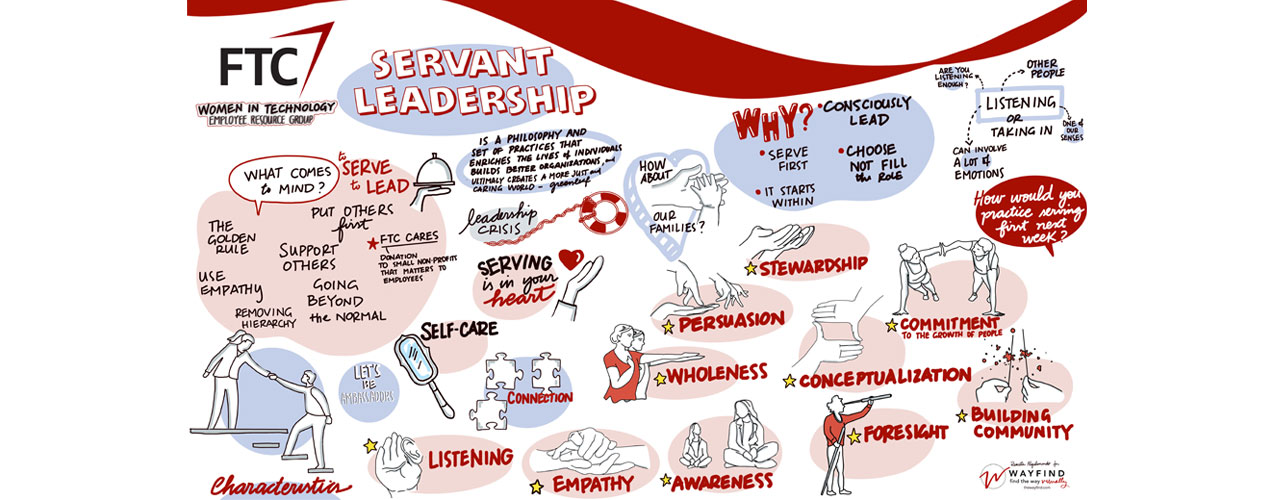Servant Leadership in a Culture of Growth
How the Ten Core Principles of the Servant Leadership Philosophy can Ignite Personal, Team, and Company Growth
I think about growth a lot: the growth of the company, the growth of our capabilities, the growth of our people, and my own personal growth as a professional, a leader, and a whole person.
Last month, the FTC Women in Technology (WIT) employee resource group explored the topic of servant leadership. In a vibrant and interactive conversation, we discussed the ten core principles of this leadership mindset and how each can act as a catalyst to spark personal, professional, and team growth. As the graphic recording from the meeting below illustrates, we explored not only what servant leadership means but why it is so impactful.
This conversation led me to reflect on how we as FTC unite the principles of servant leadership in our growth-minded corporate culture. By using the ten characteristics in our everyday interactions, we not only nurture a true servant leadership culture but also ensure our continual growth as a firm, as a community, and as people.
LISTENING
Servant leaders are active listeners. They listen to hear, not to be heard. They listen both for what is said and what is not said. From a growth perspective, they listen for opportunities for improvement, for innovation, and for making connections.
WHOLENESS
Servant leaders recognize the wholeness of their colleagues. In a culture of growth, that is shown by an emphasis on wellness and balance. We know that our employees are people, and that our employees can only be at their best if they are filling their cup in other aspects of their life beyond work too.
EMPATHY
Servant leaders aspire to understand, accept, share, and feel experiences with others. From a growth perspective, that means truly walking a mile in our clients’ shoes. We are their trusted advisors; we are there to understand their issues and seek every opportunity to support.
AWARENESS
In a culture of growth, true servant leaders need to have the ability to notice the greater context of a situation by reading and understanding different cues. They are always thinking in a holistic manner, taking input from all angles before making any conclusions.
PERSUASION
Growth-minded servant leaders drive clear, consistent, and convincing communication about our capabilities, resources, and solutions.
CONCEPTUALIZATION
Growth-minded servant leaders go above and beyond short-term asks. They are always thinking about “what’s next”, focusing on the big picture, and spending time proactively working out solutions.
COMMITMENT TO THE GROWTH OF PEOPLE
Simply put, growth-minded servant leaders nurture the personal and professional growth of their clients, colleagues, and peers.
FORESIGHT
Servant leaders utilize the past, thrive in the present, and plan for the future. From a growth perspective, this means using our lessons learned and best practices to drive solutions for our clients and colleagues.
STEWARDSHIP
Growth-minded servant leaders serve in our day-to-day and are committed to the greater good. In FTC’s culture of growth, it means we look beyond any silo to how to serve the larger agency and administration — we look for the connectiveness and drive comprehensive solutions that differentiate us as a company.
BUILDING COMMUNITY
True servant leaders consistently encourage and foster meaningful connections and engagement across an enterprise. Community is at the heart of the FTC employee experience. We emphasize teamwork and collaboration with peers, sharing knowledge, experience, and best practices across our employee family, participating in our Women in Tech (WIT) and Veteran & Military Network (VMN), and more!
Building a true practice of servant leadership doesn’t happen overnight. A true shift in mindset – and ultimately in corporate culture – begins with small acts that grow over time. The results, however, are immediate and far-reaching. The synergy that develops across teams that are connected, compassionate, and committed to each other can be a catalyst that ignites continuous growth for all – together.


